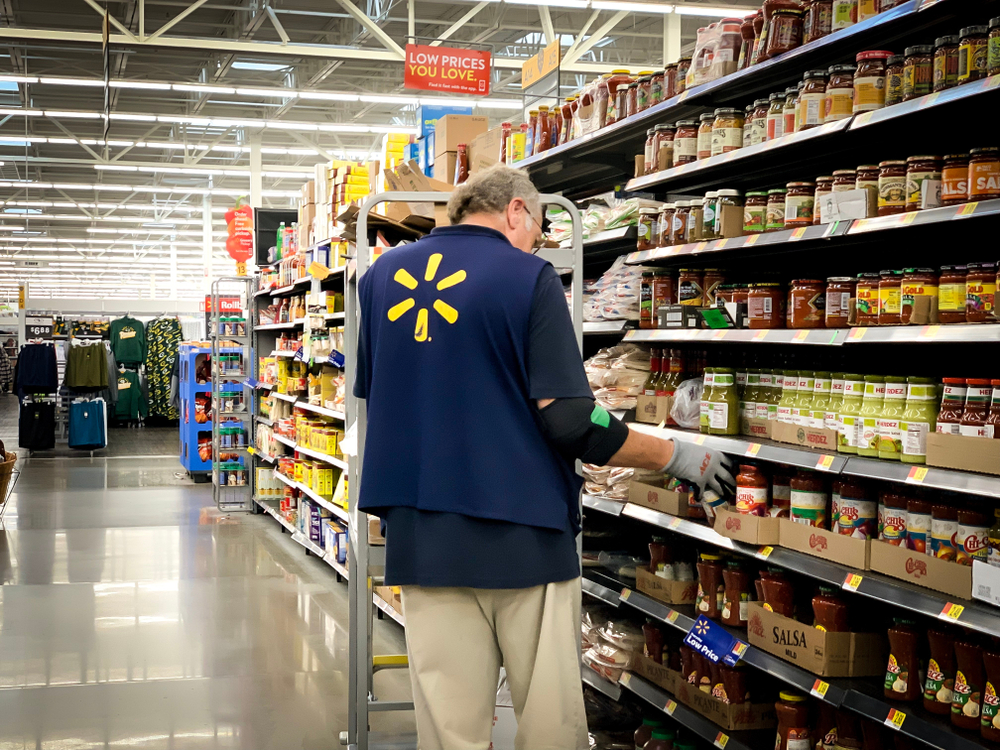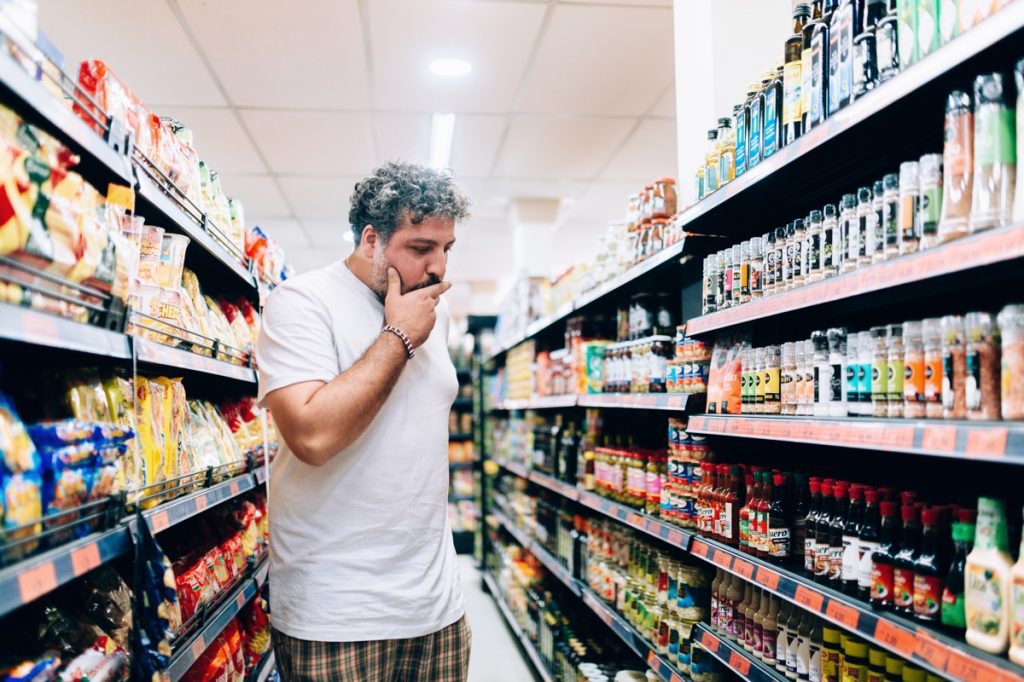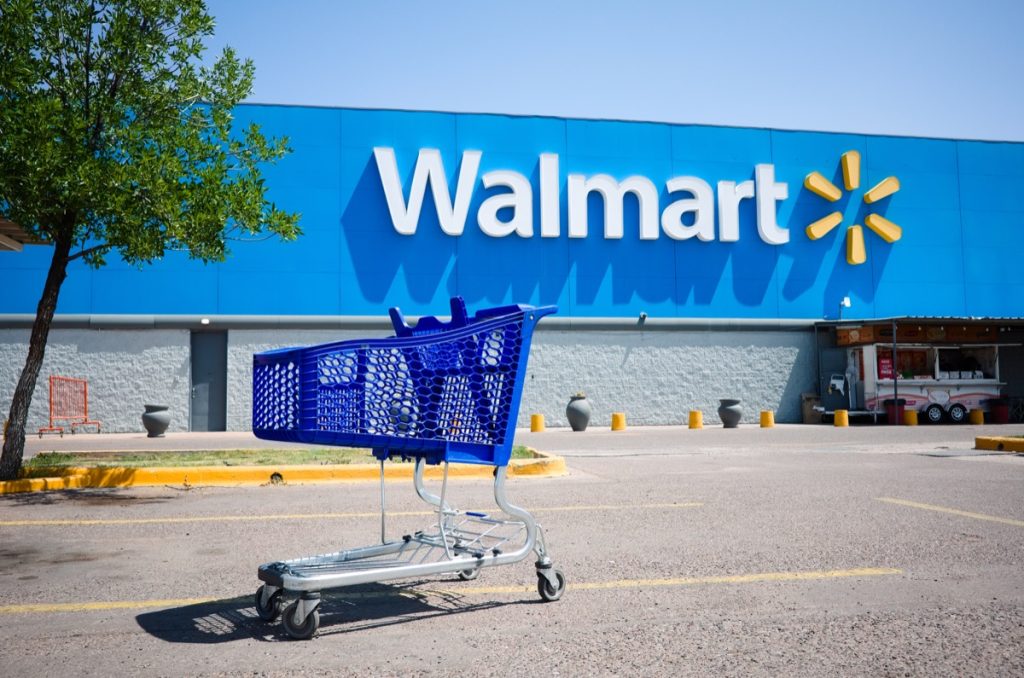Shoppers Are Turning Away From Walmart—And Ozempic May Be to Blame

Walmart may have become the nation’s largest retailer because of its broad selection of items and widespread stores, but it’s still not immune to the problems other businesses face. Changes to the store’s shopping experience like self-checkout have led to customer outrage, while new shopping patterns have led the company to close nearly two dozen stores in 2023. But now, shoppers appear to be turning away from Walmart stores—and Ozempic may be to blame. Read on to see why the company’s CEO thinks the popular weight loss drug is affecting sales.
RELATED: 6 Banks, Including Wells Fargo and Bank of America, Closing Branches This Fall.
Walmart’s CEO says data suggests shoppers may be buying fewer groceries thanks to Ozempic.

While many shoppers rely on Walmart for everything from clothing and cosmetics to electronics and everyday essentials, the strength of its grocery operation can’t be overlooked. The chain currently holds the title of the largest supermarket chain in the U.S. and the world, with $393 billion in domestic grocery sales in 2021, according to European Supermarket Magazine.
Because of its top position, the retailer is also particularly sensitive to widespread changes in consumer behavior. And during an Oct. 4 interview with Bloomberg, John Furner, CEO of Walmart U.S., said that weight loss and diabetes drugs, including Ozempic and Wegovy, could be driving down sales of food items at its stores.
“We definitely do see a slight change compared to the total population, we do see a slight pullback in overall basket,” Furner told the news outlet. “Just less units, slightly less calories.”
RELATED: Walmart Rolling Out Controversial New Shopping Carts: “These Are Terrible”.
New data could support Furner’s theory that those using the drugs are putting less into their carts.

The CEO’s statements are based on recent anonymous data gathered on American customers, which allowed the company to compare the shopping habits of those taking the drugs versus those who weren’t. However, he still stated during the interview that it was too soon to conclude the change in shopping behavior was related, Bloomberg reports.
The study comes as major companies like Walmart try to get ahead of anticipated changes in spending habits. Drugs like Ozempic work by mimicking a natural hormone in our bodies that convinces the brain we’re full, and also by slowing the digestion of food we’ve already eaten, according to UC Davis Health.
Some believe that the surging popularity of the appetite suppressants could translate into a downturn in food sales, with researchers at Morgan Stanley forecasting that 24 million people—or 7 percent of the U.S. population—will be taking the drug by 2035.
“The food, beverage, and restaurant industries could see softer demand, particularly for unhealthier foods and high-fat, sweet, and salty options,” Pamela Kaufman, tobacco and packaged food analyst for Morgan Stanley, said in a research note last month.
RELATED: Shoppers Are Abandoning Costco, New Data Reveals—Here’s Why.
Some major food companies have already begun making changes for the future.

However, Walmart’s findings may be the first red flag for food companies that have spent the past decade building toward a different future. Earlier this week, iconic breakfast brand Kellogg’s spun off its cereal lineup from its snack food division—which includes popular salty bites such as Cheez-Its and Pringles—and renamed itself Kellanvoa, CNBC reports.
The latest decision is based on previous data showing that younger consumers are more likely to snack and eat more throughout that day than take in fuller, square meals, according to market research firm Mintel. However, research now suggests that an increase in diabetes and weight loss drugs like Ozempic could lead to a 3 percent or greater decrease in sales of sweet and salty snacks, according to Morgan Stanley.
RELATED: Walmart Worker Issues Warning to Shoppers About Self-Checkout.
Walmart will still see an increase in sales in other areas thanks to the drugs’ popularity.

Still, others are pushing back on the idea that the light bites category will be deeply affected by the expected rise in weight loss drug prescriptions. This includes Mark Smucker, CEO of food and snack company J.M. Smucker, who recently defended his company’s decision to purchase Hostess Brands and its portfolio of beloved baked sweet treats such as Twinkies.
“There are multiple ways that consumers will continue to snack,” Smucker said during a recent conference call with analysts, per CNBC. “And given that consumers are going to continue to seek all different types of snacks, and sweet snacks are going to continue to be on the radar, we view that our projections here are sound.”
And while GLP-1 drugs like Ozempic could potentially be shaving off sales from one part of Walmart’s portfolio, they’re still bolstering another. Company leadership said the surge in their prescriptions has also translated into a boom for the retailer’s pharmacies, Bloomberg reports.
“We still expect food, consumables, and health and wellness primarily due to the popularity of some GLP-1 drugs to grow as a percent of total in the back half,” Doug McMillon, CEO of Walmart Inc., recently told analysts during a call.
RELATED: For more up-to-date information, sign up for our daily newsletter.